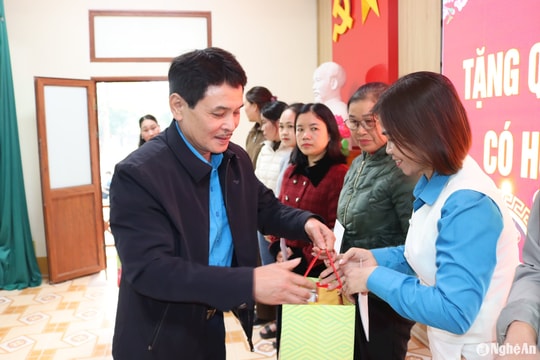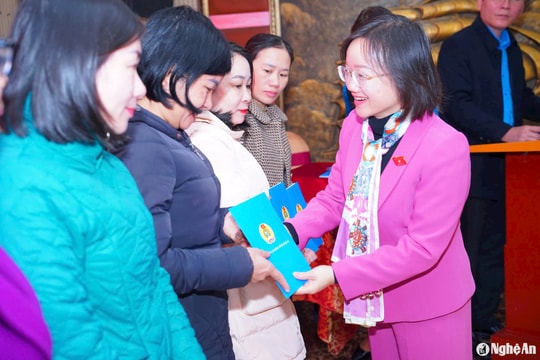The Tran Van family temple and the tomb of General Tran Suat are ranked as provincial relics.
On the afternoon of February 2, the People's Committee of Quynh Luu district coordinated with An Hoa commune to organize a ceremony to receive the Provincial Historical Relic Ranking Certificate for the Tran Van Family Temple and the Tomb of General Tran Suat.
Attending the ceremony were comrade Tran Thi My Hanh - Member of the Provincial Party Executive Committee, Director of the Provincial Department of Culture and Sports; Nguyen Van Thuong - Member of the Standing Committee of the District Party Committee, Vice Chairman of the People's Committee of Quynh Luu district; representatives of district-level departments; leaders, local authorities and numerous descendants of the family and people of An Hoa commune.

The Tran Van family, An Hoa commune, originally from Hai Duong, migrated to Tot Dong village, Hoan Hau commune, Hoan Hau canton, Quynh Luu district, Dien Chau prefecture, Nghe An town (now An Hoa commune, Quynh Luu district, Nghe An province) to settle down and develop for more than 500 years, with 20 generations of descendants. This is one of the big families, the prestigious family of An Hoa commune, with many contributions to the homeland and the country. Among them, the most prominent are Mr. Tran Trieu and Mr. Tran Suat, Mr. Tran Ba and Mr. Tran An.
General Tran Trieu was the 10th generation descendant of the family, he was born around the beginning of the 18th century. During the reign of King Canh Hung (1740-1786), King Le Hien Tong awarded him the title of General Tri Minh Nghi and the title of Van Uy Ba. Mr. Tran Trieu had contributed to quelling the rebellion and protecting the peace of the villagers, so the people in the area were very grateful. In addition, Mr. Tran Trieu also cared a lot about the spiritual life of the people in the village, he donated his land to pagodas and temples, chose land and spent money to dig wells for people to get clean water for daily use.

General Tri Uy Tran Suat was from the 11th generation of the family, the eldest son of General Tong Tri Minh Nghi Tran Tri. General Tran Suat assisted two Kings Quang Trung and Quang Toan, and was always considered a talented general, a loyal subject, and devoted himself to the cause of unifying and protecting the country.
In particular, he made many contributions to the resistance war against the Qing invaders, helping to protect the territory of the nation. Mr. Tran Ba is the 15th generation descendant of the family, an intelligent and outspoken person, who was elected as the village chief and later held the position of temporary revolutionary resistance chairman of the commune.

The Tran Van family temple was built on the sacred land of Quy Hoa village, with Thai Phuong hill as the front screen and Kim Quy mountain as the back screen. On the left is Dau canal as the green dragon, on the right is Kien Son as the white tiger.
The church has a scale of 2 ancient buildings, the house frame is made of Lim wood with traditional structure of high historical value. The church also preserves many valuable antiques such as royal decrees, stone steles, woodblocks, incense tables, incense burners which are precious antiques of historical and cultural value. The establishment of scientific records to classify relics is a legal basis, creating conditions for protecting and promoting the value of relics.

With such historical and cultural values, the Tran Van family temple and the tomb of General Tran Suat were ranked as provincial-level historical and cultural relics by the People's Committee of Nghe An province in Decision No. 3620/QD-UBND dated December 27, 2024.



Speaking at the ceremony, comrade Tran Thi My Hanh - Director of the Department of Culture and Sports acknowledged the great contributions of the Tran Van family in recent years; at the same time, she hoped that in the coming time, descendants in the family would continue to propagate and raise awareness of the law on cultural heritage, and carry out the preservation and promotion of the value of relics according to the provisions of law.
Maintain spiritual and cultural activities associated with relics, promote the tradition of solidarity within the clan, and at the same time step up propaganda work to promote traditions, advertise relics to attract tourists to visit...

.jpg)

.jpg)


